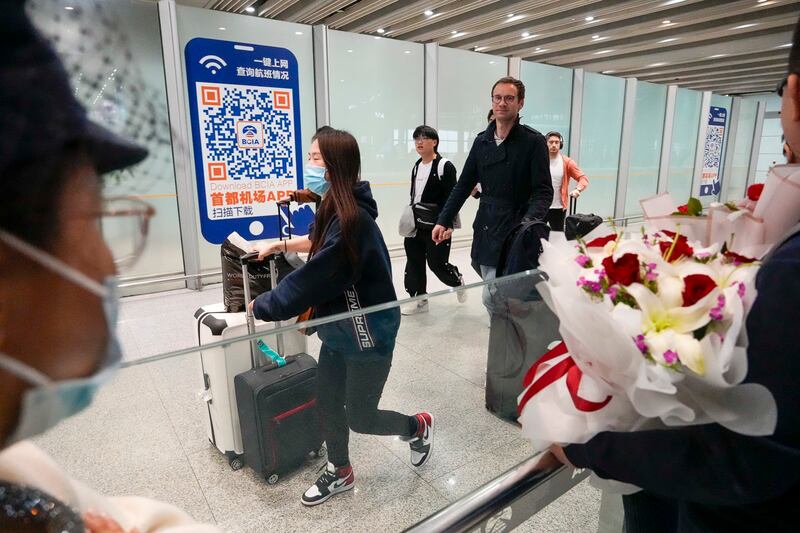Still a great place to visit, but no longer a land of opportunity for aspiring expatriates -- that seems to be the international verdict on China these days.
Since the lifting of stringent COVID-19 restrictions in late 2022, the Chinese government has stepped up efforts to attract more foreign nationals back to China to work and study, offering a slew of visa-free entry schemes, cheaper visas and tax incentives in recent months.
Premier Li Qiang has pledged to rebuild the country's brand as an investment destination, even as his boss Xi Jinping continues to emphasize a domestic economy that is no longer reliant on exports.
But growing political tensions with Washington and its allies, a faltering economy and a national obsession with foreign "spies" has hampered Beijing's charm offensive.
China issued just 711,000 residence permits to foreigners last year, a fall of 15% from 2019, according to figures from the National Immigration Administration cited in the Wall Street Journal on March 18. Permits issued to foreigners living in cosmopolitan Shanghai fell from around 70,000 in 2020 to 50,000 in 2022.

The number of short-term visitors has plummeted by around two-thirds over the same period, the report said.
Meanwhile, the number of U.S. students in China has dwindled to just 700 – down from 15,000 six or seven years ago, U.S. Ambassador to China Nicholas Burns told a seminar at the Brookings Institution in December 2023.
Some universities have been upgrading their facilities in a bid to attract more foreign students, prompting an angry online backlash for the Nanchang Hangkong University earlier this year after the school allocated 140 million yuan for a dormitory upgrade that wasn't extended to domestic students.
RELATED STORIES
[ 4 in 5 Americans have a negative view of China: surveyOpens in new window ]
[ Global survey: China viewed in more negative lightOpens in new window ]
[ China targets younger Taiwanese with junkets for island’s celebritiesOpens in new window ]
[ China's ill-defined spy law dampens foreign investor confidenceOpens in new window ]
‘United Front mindset’
An alumnus of Qingdao University in Shandong who gave only the pseudonym John for fear of reprisals told RFA Mandarin that the special treatment offered to foreign students is part of the ruling Chinese Communist Party's outreach and influence operations, known as the United Front.
"Every university has a program for foreign students because of the United Front mindset," John said. "While foreign students get high subsidies and scholarships, Chinese students by contrast have to take out loans to go to school, and many can't go to university because they can't afford the tuition."
While some foreigners are clearly traveling to China following the end of pandemic restrictions, many are unwilling to stay there long term, interviewees told RFA Mandarin.
Part of the problem is widespread government censorship and a lack of access to overseas websites including Google, Instagram and X without the use of banned circumvention software.
Another barrier is an atmosphere of mistrust that has seen market research and other industry consultancy work criminalized as a threat to "national security," dampening investor confidence and leading to fewer opportunities with foreign companies.

"Short term, I felt very comfortable ... I didn't feel like my rights were necessarily infringed upon, but I was also very cognizant of the fact that I was coming back to the U.S.," U.S. national Chloe Ross Bohn, 23, who recently completed a year-long exchange program at Nanjing University, told RFA Mandarin in a recent interview.
"If I was living there long term, the I guess sudden changes and the lack of transparency from the government would make me nervous," said Ross Bohn, who said she fully enjoyed her time in China as "a guest," however.
"I think it's easy to be a guest in another country and follow rules regardless of my opinions about those rules for one year," she said. "For five plus years, I think that would be a very difficult situation for me."
Ross Bohn may not be the only one who feels that way.
Souring business sentiment
The American Chamber of Commerce in China found in a recent business report that "business sentiment has continued to deteriorate," and that just 33% of companies said staff would be willing to relocate to China.
Just 52% of companies said they are optimistic about doing business in China over the next five years, the lowest level of optimism reported since the AmCham Shanghai Annual China Business Report was first introduced in 1999.
Meanwhile, “concern over future Chinese commercial policies" was a factor for 48% of the 325 companies who responded to the survey, the report said.
Italian national and Shanghai resident Susan Rui, who gave only a pseudonym for fear of reprisals, said that while there has been a visible increase in foreign tourists in the city in recent months, many shops and restaurants have closed in the city's Jing'an district, once home to large numbers of expatriates.
The apartment she currently rents came with much of the furniture and fittings intact, because its previous occupant, a German national, left China in a hurry to escape the restrictions of the zero-COVID policy.
It's not just Americans who remain unimpressed by attempts to get them to live and work in China long term.

Uzbekistan national Rakhmonberdi Khajiev is currently studying computer science at Beijing Institute of Technology. He arrived in 2019, only to be plunged into the lockdowns, travel bans and compulsory daily testing and quarantine of the zero-COVID policy.
While Khajiev maintains a positive view of China, and plans to take a master's degree there too, he has no plans to stay beyond his studies.
"My parents [run] a local shop ... and they sell clothing stuff for women," he said. "Most of the things that they sell actually are imported from China."
"I always wanted to study abroad, and they were like, if you go to China, maybe you could also like, learn the language and help us out with our business," he said.
Future fears
But he is pessimistic about any employment prospects after graduation.
"It's kind of hard to break into tech [here]," he said. "There's ... a lot of competition going on, even among the Chinese citizens. As a foreigner, it's kind of hard to get a job because you have to compete with them as well."
Then there's the language barrier.
"I might be good at conversations but still when it comes to terminologies and tech stuff, I'm not that still good," Khajiev said, adding that it's not always easy to get sponsorship for a work visa either.

A 26-year-old Russian woman who gave only the single name Olya said she enjoyed her recent trip to China in May, but wouldn't want to live there due to the threat of military conflict in the Taiwan Strait.
"I went to China to have some new experiences, and I got it," she said. The food is great, and there are many cultural and historical attractions to visit."
She would like to go back and see some more, but said it was hard to see herself living there.
"Everyone in the world knows that China and Taiwan have quite tense relations," Olya said. "When you are from one country that has quite aggressive relationships with their neighbors, you don't want to go to another country where there is a possibility of anything going on in the nearest future."
"You want to go to some very, very safe place," she said.
Translated by Luisetta Mudie. Additional reporting by Li Yaqian.
